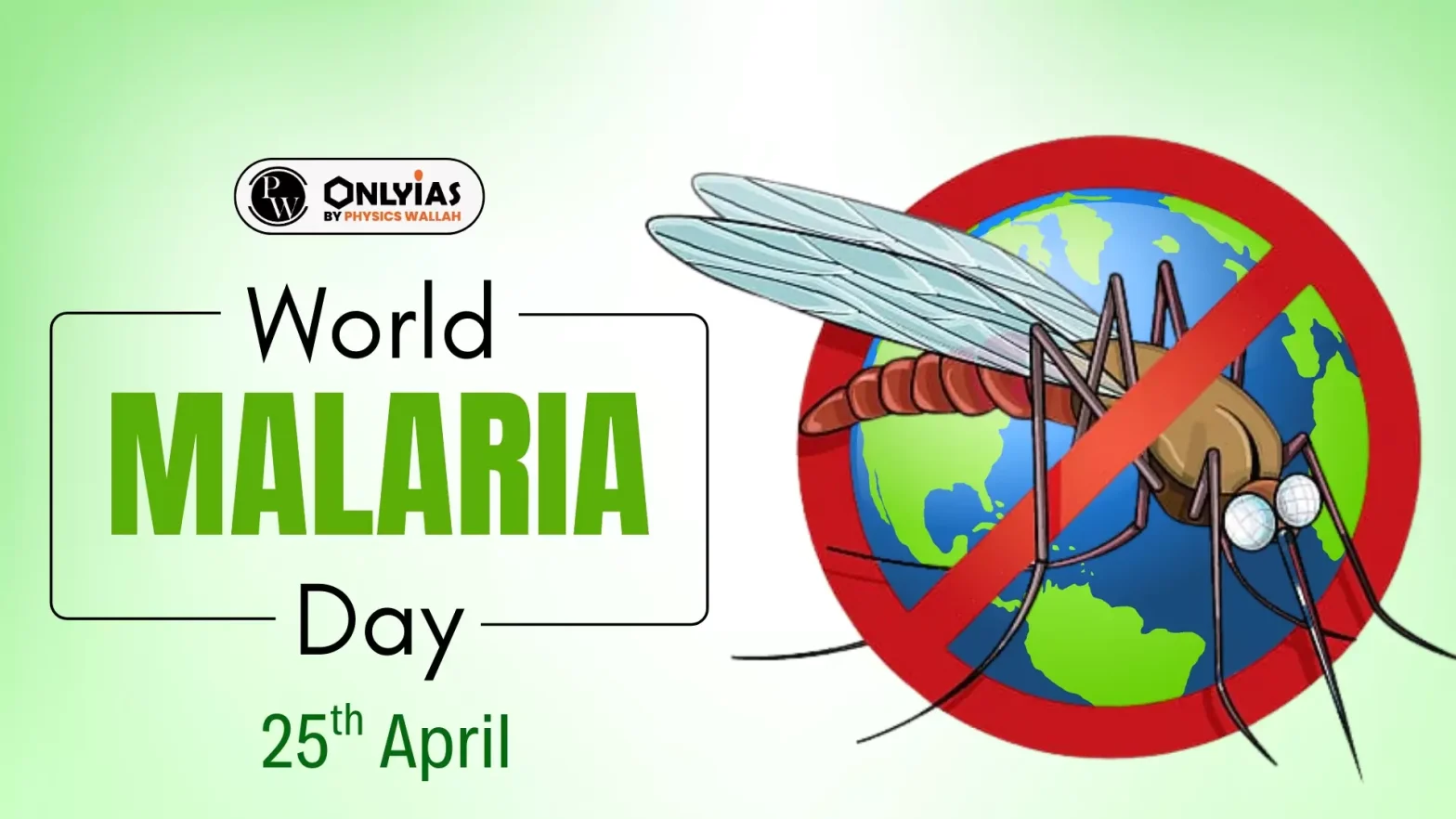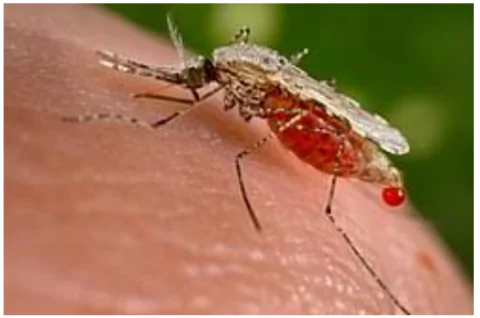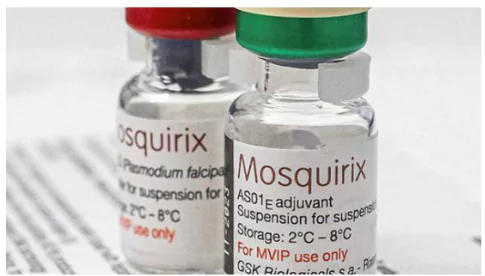World Malaria Day 2025 will be observed on 25 April with the theme “Malaria Ends With Us: Reinvest, Reimagine, Reignite.” Explore malaria prevention, India’s eradication efforts, vaccine updates, and the significance of Anti-Malaria Month.

World Malaria Day 2025, observed annually on 25 April, is a significant global health awareness event dedicated to eliminating one of the world’s deadliest diseases—malaria. This day, established by WHO Member States during the 2007 World Health Assembly, promotes awareness, action, and investment in the fight to eliminate malaria. Each year, it motivates and inspires global attention on the challenges and progress in malaria control, urging stakeholders worldwide to intensify their efforts.
World Malaria Day 2025 was observed globally on 25th April 2025 to raise awareness about malaria and encourage efforts towards its elimination. This day brings together global leaders, health organisations, researchers, and communities to reaffirm their commitment to a malaria-free world. With new strategies and renewed energy, World Malaria Day 2025 promotes the theme “Malaria Ends With Us: Reinvest, Reimagine, Reignite.”
| World Malaria Day 2025 | |
| Particulars | Details |
| Name of the Day | World Malaria Day |
| Date | 25th April 2025 |
| Day | Friday |
| Theme | “Malaria Ends With Us: Reinvest, Reimagine, Reignite” |
| Observed By | World Health Organization (WHO), National Governments, NGOs, UNICEF |
| Objective | To raise global awareness and support for malaria prevention and cure |
| First Celebrated | 25th April 2008 |
| Origin | Initiated by WHO during the 2007 World Health Assembly |
| Related Campaigns | Roll Back Malaria, Global Technical Strategy for Malaria 2016–2030 |
World Malaria Day is observed on 25th April every year. It was established by WHO Member States during the 2007 World Health Assembly to highlight the need for sustained political commitment and continued investment in malaria prevention and control.
The day evolved from “Africa Malaria Day,” previously celebrated only in African nations. Its transformation into a global event reflects the need for a united response across continents.
This year, the World Malaria Day 2025 theme is “Malaria Ends With Us: Reinvest, Reimagine, Reignite.” The theme underscores the importance of community involvement, financial backing, and innovation to defeat malaria once and for all.
The 2025 theme answers this critical question by inspiring action at all levels—from governments and NGOs to individuals—to recommit to ending malaria by focusing on tested interventions and rethinking strategies in the face of new challenges. This call-to-action emphasises the need for:
This theme highlights the role of each individual and community in fighting malaria and ending its transmission.
Malaria is a life-threatening disease caused by Plasmodium parasites, transmitted to humans through the bites of infected female Anopheles mosquitoes. There are five species of Plasmodium known to infect humans, with P. falciparum and P. vivax being the most dangerous.

Malaria caused by these parasites leads to symptoms like fever, chills, headache, nausea, vomiting, and fatigue. If left untreated, it can escalate to severe complications, including cerebral malaria, severe anaemia, coma, or death.
June is commonly referred to as Anti-Malaria Month, culminating in the global observance of World Malaria Day 2025. It is a time when various campaigns, public health messages, and awareness drives are launched to educate people about malaria and the importance of its control and elimination.
Governments and health organisations worldwide use this month to highlight malaria’s impact and promote preventive strategies such as using mosquito nets and repellents.
The global malaria burden remains severe, especially in sub-Saharan Africa and parts of Asia. According to WHO:
Despite decades of progress, malaria still claims one life every minute, largely due to disruptions in control measures caused by conflicts, climate change, and limited access to healthcare.
Malaria in India has seen a significant decline in recent years. From over 1.1 million cases in 2015 to just over 227,000 in 2023, with deaths falling from 384 to 83 in the same period. India has made progress through the Malaria Eradication Programme in India.
However, challenges remain. Most cases still arise from tribal, hilly, and forested regions, which account for 80% of the burden. In 2023 alone, India recorded 83 malaria-related deaths, highlighting the continued need for targeted interventions. Sustaining surveillance and control measures in these regions is vital.
India is committed to eliminating malaria by 2030, aligning with the Global Technical Strategy for Malaria 2016–2030 set by the WHO. The malaria eradication programme in India includes intensified vector control, surveillance, public education, and rapid access to treatment.
The National Framework for Malaria Elimination (NFME) lays down key strategic objectives to achieve this target. With consistent political commitment and community engagement, India aims to become malaria-free within the next five years.
Recent advancements have led to the development of vaccines. The RTS, S/AS01 (Mosquirix) is the first approved malaria vaccine in India and globally. It is effective particularly against Plasmodium falciparum, the infection among children.

India is also conducting pilot implementations in selected regions with support from Gavi, the Vaccine Alliance, and the WHO. The vaccine complements existing preventive measures such as insecticide-treated nets and indoor spraying.
While this is a significant breakthrough, wider implementation and research into more effective, long-lasting vaccines remain critical to achieving elimination.
India’s first malaria eradication efforts began in 1953 with the launch of the National Malaria Control Programme (NMCP), later converted into the National Malaria Eradication Programme (NMEP) in 1958. While initial progress was strong, resistance to insecticides and emerging drug resistance led to setbacks. The resurgence in commitment in recent years, through programs like NVBDCP (National Vector Borne Disease Control Programme), has reignited hope for elimination.
Preventing malaria requires a combined effort at both the individual and community levels. Here are a few ways to protect yourself and others:
The observance of World Malaria Day 2025 matters more than ever. With threats such as climate change, urbanisation, and mosquito resistance to insecticides, the world must stay vigilant. As the theme “Malaria Ends With Us” suggests, victory over malaria is possible only through:
It’s time to reinvest in strategies that work, reimagine new pathways, and reignite the fight against malaria, together.
World Malaria Day 2025 reminds us that malaria is preventable, treatable, and ultimately eliminable. As the world faces evolving challenges, from climate change to healthcare disruptions, the urgency to act is greater than ever.
With strong global partnerships, targeted national strategies like the malaria eradication programme in India, and innovative solutions such as the malaria vaccine, we can move closer to a world free of malaria.
Ready to boost your UPSC 2025 preparation? Join PW’s UPSC online courses today!
Malaria is a mosquito-borne infectious disease caused by Plasmodium parasites, leading to fever, chills, and, in severe cases, death.
Malaria is caused by the bite of an infected female Anopheles mosquito carrying Plasmodium parasites.
The World Malaria Day 2025 theme is “Malaria Ends With Us: Reinvest, Reimagine, Reignite,” focusing on global unity for malaria elimination.
June is known as malaria month, culminating in World Malaria Day observed every year on April 25 to raise awareness and action.
Yes, the RTS,S/AS01 vaccine, known as Mosquirix, is the first approved malaria vaccine in India and is being piloted in selected regions.
The malaria end target India aims to achieve zero indigenous cases by 2027 and full elimination by 2030 under the national framework.
<div class="new-fform">
</div>